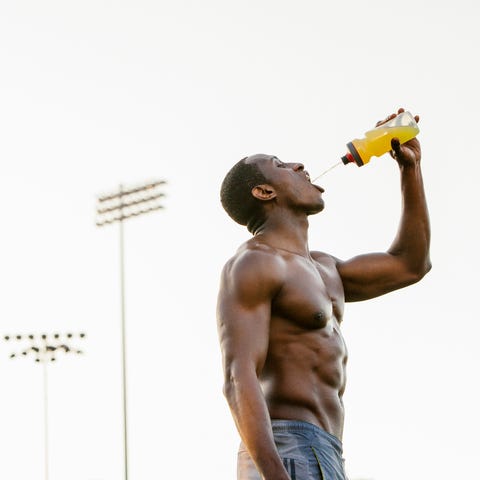
You’ve just finished a taxing workout, and it’s time to refuel.
Maybe you don’t like the taste of water, or you prefer a drink with some nutrients that’ll help you replenish what you sweat out.
Well, the sports drinks market is there for you—with racks of options that range from a bounty of “ades” to alkaline waters to energy drinks.
And then there are the bottles bearing labels that read as if they were the menu of a trendy boutique smoothie shop: “B-vitamins! Zinc and electrolytes! Bee pollen!” (Bee pollen??) It’s not water, it’s better! Right?

If you’re to trust the marketing on their labels, these drinks will leave you feeling as energized as a pro-athlete ready for the championship game.
One category of these drinks is Vitamin Water, which is owned by Coca Cola. The line includes products with names like “revive,” focus,” and “energy” and their the clear bottles contain brightly hued liquids.
It’s hard not to fall for the label lingo, and even harder to tell which of these sports drinks are telling the truth and which are pure snake oil.
Because not all sports drinks are made the same. Some are filled with more empty promises than actual useful ingredients. Don’t fall for the flashy marketing and claims to revitalize you. They may sit next to the water bottles in the grocery aisle, but there’s more behind some sports drinks than you may realize.
If your first instinct is to grab a bottle of Vitamin Water, keep reading. It may not be the post-workout drink you’re looking for.
Is Vitamin Water Healthy?
According to Men’s Health advisor Dezi Abeyta, R.D.N., vitamin waters market themselves as a refreshing drink filled with antioxidants and vitamins like B and C.
Don’t be fooled, though.
If you’re eating a healthful diet, you probably don’t need more vitamin B or C. “In most cases, people aren’t really deficient in B’s and C’s,” Abeyta says. “And on top of that, they’re water soluble vitamins so you’re just going to end up excreting them out.”

Unfortunately, Vitamin Water is also usually high in sugar with added flavoring. For reference, a regular Pepsi bottle contains 40 grams of sugar. In comparison, Vitamin Water’s Power-C Dragonfruit flavor contains 32 grams of sugar. Vitamin Water does have zero sugar options, but still there’s just a lot of unnecessary ingredients added, Abetya says.
Instead, Abeyta says to find a drink focused on restoring electrolytes (like sodium). Try Gatorade or Powerade, two popular drinks among professional athletes. Go for the low-sugar options, since these too have added sugars. Even with their sugar content, they’re better suited for anyone looking for a quick way to regain lost nutrients from exercise and sweating. Of course, Abeyta says whole food is always best though.
“Do yourself a favor and get some fruit, sprinkle a bit of salt on it,” he says. “You’re getting the benefits of what you’re actually looking for with vitamin water but vitamin water just doesn’t add up to what you need.”
For someone who enjoys the flavored water drink though, don’t panic. Drinking vitamin water alone probably won’t cause your sugar intake to climb to worrying levels. “It’s one of those things, kind of like sodas. If you enjoy it, go ahead and consume it in moderation,” Abeyta says.
Source: Read Full Article